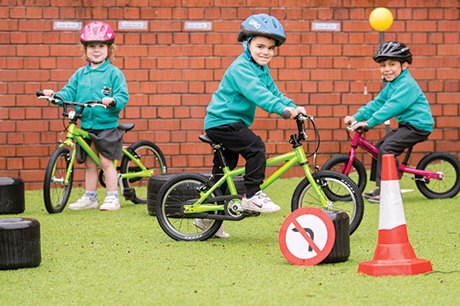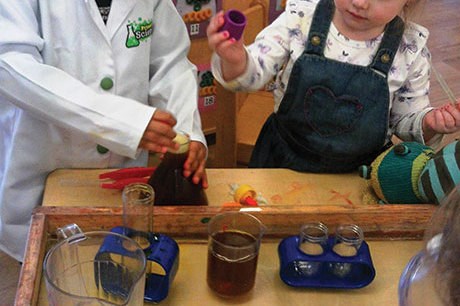Nursery Chains: Curriculum - Get ready
Annette Rawstrone
Monday, November 14, 2016
In response to potential loss of business to school settings, many nursery chains are providing in-house enhancement programmes to improve children’s learning and staff skills, writes Annette Rawstrone

Nurseries have been buying in schemes to further children’s learning and development for many years, but now nursery chains are increasingly utilising the expertise within their teams to develop their own enhancement programmes. This is proving to be good business sense – not just benefiting the children but impressing parents, boosting retention rates and up-skilling staff.
Many of the nursery groups have developed programmes to reassure parents around issues of school readiness. Lisa Snell, early years director at Busy Bees, says, ‘Parents are anxious that their children are prepared for school. They want their children to feel confident, to have high esteem and fit in at school. They are concerned about academic and also emotional ability.’
The programmes are also used as a tool for demonstrating to parents that there is not the need to move their child to a school nursery at the age of three. A recent study by Co-operative Childcare found that 87 per cent of parents mistakenly believe that their child is more likely to get a place at their preferred primary school if they attended the incorporated pre-school. The chain launched a pre-school model in June to help children to make the transition to school and reassure parents that children are getting the educational support they need from the nursery setting.

Co-operative Childcare's bike-riding lessons
‘No way should a child outgrow nursery, it’s about us providing them with the challenge. In a child-initiated setting they should never be bored. If they are, it’s because we’re not doing our job,’ says Co-operative Childcare quality excellence manager Babita Saroy. ‘Parents have commented in the past that their children “just play” at nursery and come home mucky. We now have a more structured approach and can explain to parents what we provide, why and that their children will get the same learning experiences as at school.’
As part of the model, children can choose to wear a uniform, are given book bags and can learn how to ride a bike through Co-operative’s Ready Steady Pedal programme – a skill which many parents surveyed wanted their children to learn.
Happy Days Nurseries also noted that it was losing three-year-olds to school nurseries. It launched a school-readiness programme in response to this and to ensure each child was achieving their individual potential in getting ready for school.
‘We sensed a perception among families that they needed to take their children elsewhere for them to get ready for school,’ says childcare and education manager Sarah Warne. ‘In contrast, we knew that children in our care did a lot more than that, so the Smart Start School Readiness Programme was borne out of educating parents that we offer play-based learning opportunities which do get children ready for school. We’re a group with a clear ethos of open-ended play opportunities, but this programme put a more formal spin on it for parents.’
The programme, based on the EYFS, was developed by Ms Warne in consultation with parents and school Reception teachers and introduced in summer 2015. A range of specific activities has been introduced for children aged three and older that are designed to be fun and build upon their natural curiosity and desire to learn. Regular email updates are sent to families which include ‘top tips’ to try at home, such as giving children a list of items to find when shopping.
‘The programme is definitely a selling point for parents,’ says Ms Warne. ‘Our retention of three-year-olds has increased after just one full year of implementing it. We’d now like to write a programme focusing on supporting two-year-olds in the core skills.’
ENHANCED PROVISION
Busy Bees offers a number of enhancements, from ‘Problem Solving to Mathematics’ – to build on the mathematics teaching taking place in the settings – to ‘Babble to Chatter’, which helps nurture children’s language, and ‘Shake and Write’, which supports children as they develop the physical skills needed for handwriting. Each enhancement is written and delivered by the chain’s childcare team and offers different play and learning opportunities within day-to-day activities and practice.
Along with giving children an increasingly more stimulating environment, the enhancement programmes enable Busy Bees staff to increase their knowledge in specific areas of child development when needed.
‘We’re able to offer the enhancements in addition to the routine staff training. For example, if a cohort of children have outcomes that are not favourable in communication and language, then we can work with staff on our “Babble to Chatter” programme so that staff can impact the children’s outcomes,’ says Ms Snell.
‘We have noticed that practitioners can have a fear of maths and not realise how straightforward it can be. Now we are able to help them to understand, refocus and not overcomplicate it. By boosting the staff we are giving them the confidence to pass their knowledge onto the children.’
Nicola Amies, director of early years at Bright Horizons, agrees the ‘Growing’ programmes it has developed – Growing Mathematicians, Scientists, Readers and Writers – have increased staff confidence and knowledge.

Bright Horizons' 'Growing Scientists' programme
‘We found that a lot of staff had the core qualifications but not a solid understanding of child development and how children learn, or a wide repertoire of experience of provision to draw on to help children to develop. We found that we needed to show staff how children develop and needed to create resources to fill the gaps,’ she says.
‘Rather than get something off the shelf, we were able to utilise our internal expertise and wealth of educational knowledge across the nurseries to develop something that is unique in the sector. The books we’ve created are full of quality content, presented attractively and durable. Staff find them helpful and inspiring.’
Activities are also shared with parents so they can do them at home, and have proved so successful that parents want copies of the books too. Bright Horizons is looking at developing something similar aimed at families.
MAKING IT FUN
The enhancement programmes are integrated into the nursery day during play so that children don’t realise that they are doing, for instance, a numeracy activity. ‘It’s not a programme that the children have to sit down and do,’ emphasises Ms Amies. ‘In a day there could be three science activities planned depending on the children’s interests and needs. The books signpost staff to more resources so that they can provide rich, exciting experiences.’
Ms Snell agrees. She says, ‘If they get enjoyment from it then the concepts that they learn will be in their mind and vocabulary. It must be done in a play environment – it’s very difficult to sit at a desk and explain less and more or over and under; it has to be fun.’
Early years writer and consultant Penny Tassoni believes these enhancement programmes are positive for nursery chains because they enable continuity throughout the nurseries and for children to be exposed to a range of experiences.
‘What enhancement programmes shouldn’t be about is activities done for the sake of it such as flash cards and trying to be a mini-school. That’s where I get anxious,’ she says. ‘Enhancement programmes should take children’s knowledge one step further but recognise that it’s a long way from formal learning. Programmes should always be tailored to children’s individual needs and not just based on their age. Practitioners need to be clear on the purpose of the programme and very reflective – is this the best and most interesting way to help this child to learn?’
EDUCATIONAL VALIDITY
Nursery groups have found that by developing enhancement programmes they have also helped practitioners to articulate the educational validity of what children are experiencing in the setting.
‘By developing the resources, we have helped staff to understand how children develop their early maths, reading and writing and how they can support it. Not only that but they can now show parents how we help their children to become mathematicians, readers and writers, scientists and artists,’ says Ms Amies.
‘It has helped them to understand pedagogical foundations and articulate them to parents, which is a selling point.’




